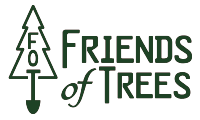Category: Community
Together we can protect trees and our communities: Friends of Trees Op-Ed
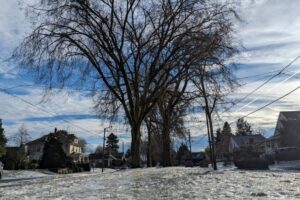
On January 21st, The Oregonian published an op-ed written by Yashar Vasef, our executive director, and Litzy Venturi, our community tree care coordinator: “We must invest in tree care to protect trees and our communities.” Read the full piece below.
Opinion: We must invest in tree care to protect trees and our communities
Climate change and its severe impacts force us to live with dual realities: We need trees more than ever and we need to recognize that extreme weather can turn them into hazards. After hundreds of trees and large limbs fell around the Portland metro area during this historic winter storm, we know that people may be concerned about the trees in their neighborhoods. The impact of a downed tree is serious and often devastating.
The response is clear, but not necessarily easy. Not only do we need to continue to plant trees to grow our urban canopy, but we also need to invest more time, knowledge and resources into assessing, protecting and maintaining the trees we have. As part of that, we must also deal with trees that need to be removed and replaced due to poor health or the potential threat they pose to homes or businesses.
Trees are a crucial ingredient for a healthy, resilient and livable community. How do we set our trees up for success in the face of potential extreme weather? It starts with planting the right tree in the right place. Sometimes people favor certain species because of sentiment or aesthetic appeal, but if they aren’t planted in a place with the right conditions, they’re more prone to failure. Selecting a tree for the available space, light and soil type is the first step in giving a tree a long healthy life.
The next step is to invest in caring for young trees after they’re planted. Proper watering techniques encourage roots to spread into a wide, stable network. Mulching around a tree’s root zone provides the soil with needed nutrients and structure. The right pruning plan will allow a tree to establish a strong trunk and a stable shape and mitigate the risk of limb failure. Tree care is a lot like preventative medicine. Keeping a tree healthy will reduce the risk of catastrophic failure.
You might be looking at a large tree in your own yard and wondering what to do next. While concern after this winter storm is natural, it’s important to remember that the benefits of trees far outweigh the risks. Trees create oxygen, abate pollution and cool our neighborhoods. It’s important not to over-correct by removing healthy trees. This was an unusually catastrophic weather event, and while hundreds of trees fell, millions didn’t. Still, there are steps you can take as a tree owner, and that we can take as a community, to better care for our trees and reduce the risk of catastrophe in the future.
An arborist partner of ours, Chad Honl, pointed out in a recent Oregonian/OregonLive story that this was “a perfect storm for knocking over trees,” and that even trees he would have characterized as stable toppled over in the storm. That’s a scary prospect, especially as climate change increases chances for extreme weather. But it just means that we need to learn more about what happened – which kinds of trees fell and what factors may have made some more vulnerable to failing than others. We agree with Honl’s call for trees to be assessed and reassessed with storms like this in mind. Understanding and addressing risks in advance of the next storm can save a lot of money, trouble and even lives. If you’re worried about your tree, you should have it inspected by a certified arborist for maintenance needs and potential problems.
A greater investment in trees doesn’t just mean planting more trees. It means taking care of the trees we have. In response to the unexpected revenue from the Portland Clean Energy Fund, Portland City Commissioner Carmen Rubio has called for additional climate investments, including $100 million for the protection and maintenance of 240,000 right-of-way street trees between the sidewalk and the street. We need to protect our mature trees and protect our communities by making sure those trees are safe.
The more mature a tree gets, the more benefits it provides: more carbon storage, more air and water quality benefits, more shade, more habitat. That’s why we need to invest in the health of our trees, for our safety in the event of a winter storm or heat wave, for our daily mental and physical well-being, and for the health of the planet.
Tending The Land. Together.
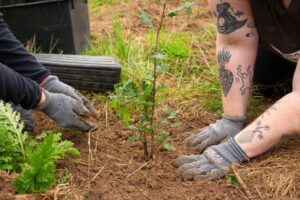
By Yashar Vasef, Executive Director, Friends of Trees
The first planting event of the season always sets the stage for me and opens me up to all the connections that can happen when you bring people together. My first event this year drove that home and more. Friends of Trees helped put on a land tending event at Portland Community College – Rock Creek in partnership with Indigenous community groups and other local partners.
Together, we worked to restore what had been a cow pasture on campus at PCC back to an oak wetland. Working with Wisdom of the Elders, the Five Oaks Museum, and Kimimela Consulting gave us the chance to learn about the history of the land and call back to what the original stewards of the lands would have planted. We planted evergreen huckleberry, beaked hazelnut, and of course, Oregon white oak. Once these plants get established, Indigenous communities will be able to forage this land.
More than planting, the day was all about connection.
I met one of our crew leaders, Emily, who has been volunteering with Friends of Trees since she was young. She spoke to me about how much she’s loved getting to see the plants and trees she’s planted grow over time. The event felt truly intergenerational, from one of our long-time crew leaders to a student who saw the land tending event on the school calendar and told me that she couldn’t have been happier to come join.
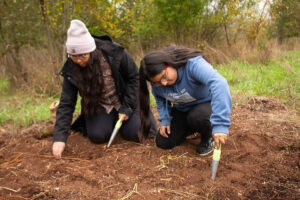
It was the first planting event for our PGE Project Zero intern Jose. Meng Vue, the Green Space specialist who led this awesome event, talked to me about how Jose is passionate about nature and youth education and that he’s brought such a positive energy to our team. His hard work hasn’t just helped us grow plants, it’s helped our team and our projects flourish too. It was awesome to see him learn the ins and outs of hosting a community event.
I got to spend quality time with Adrienne Moat, the Workforce Development Manager at Wisdom of the Elders and a board member at Friends of Trees, whose support and guidance is so valuable. One of the PCC professors I met told me how important it was for BIPOC people to get together and plant side by side. I felt that too, especially as I connected with several people there over our immigrant backgrounds. These are the sort of deeper conversations made possible by having community planting events like this, and it’s something that I really cherish.
At the start of every season, I’m reminded that getting my hands in the dirt is so spiritually cleansing for me. Sharing that feeling with others makes it feel even better.
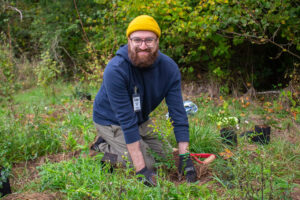
This event was put on in partnership with Portland Community College, Clean Water Services, Tualatin Hills Park & Recreation District, Five Oaks Museum, Wisdom of the Elders, and Kimimela Consulting.
What Coalition Means to Friends of Trees
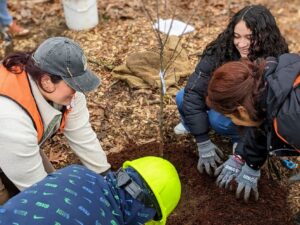
This fall, an 11-member coalition led by Friends of Trees was awarded a $12 million Urban and Community Forestry Grant from the U.S. Department of Agriculture as part of the Inflation Reduction Act (IRA) grants. The grant will fund the engagement of low canopy neighborhoods included in the Biden-Harris Administration’s Justice40 initiative, which will bring resources to communities most impacted by climate change, pollution, and environmental hazards.
The driving theme of the IRA Project is coalition building.
Coalition building goes hand-in-hand with Friends of Trees’ mission to grow community by planting and caring for trees and natural areas together. While we are proud of our past and existing partnerships, this new project is an unprecedented opportunity to take our approach to partnering to the next level by more meaningfully and responsively collaborating with community stakeholders. This includes carving the time and capacity to connect as project partners and people.
We are so excited to work closely with our partners on this project: APANO, Black Parent Initiative, City of Gresham, City of Portland, Columbia Slough Watershed Council, Connecting Canopies, Depave, POIC, Verde, and Wisdom of the Elders. We’ll be spotlighting each of these partners over the next year as we work together on a coalition model that moves us forward as a community team. It’ll be a big, complicated effort, but one that is certainly worth taking on so that we can build a more equitable urban forest.
The efforts toward this community coalition made the IRA coalition possible. And it’s become abundantly clear that it played a significant role in securing this transformative coalition grant that’s unprecedented for Friends of Trees! Learn more about the project here.
Coalition Led by Friends of Trees Awarded $12M Community Forestry Grant
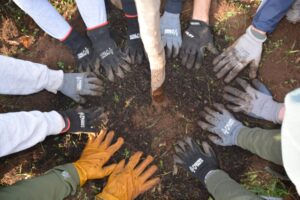
Friends of Trees | FOR IMMEDIATE RELEASE
For more information:
Friends of Trees: Yashar Vasef, Executive Director; [email protected]
Please contract coalition members for more information about their organization’s specific project role and activities (details below)
Portland, Ore. (9-14-23) — An 11-member coalition led by Friends of Trees was awarded a $12 million Urban and Community Forestry Grant from the U.S. Department of Agriculture as part of the Inflation Reduction Act grants. The grant will fund the engagement of low canopy neighborhoods included in the Biden-Harris Administration’s Justice40 initiative, which will bring resources to communities most impacted by climate change, pollution, and environmental hazards.
The partner coalition includes APANO, Black Parent Initiative, City of Gresham, City of Portland, Columbia Slough Watershed Council, Connecting Canopies, Depave, POIC, Verde, and Wisdom of the Elders. The $12 million award will direct funds to these partners and Friends of Trees across five years. This is a partial award, as the original request was for $17.5 million, and the details of the award have not yet been provided.
The coalition’s proposal includes funding for community forestry work including tree planting, natural area restoration, post-planting care, community education, opportunities for direct community input and participation, and workforce training.
“This award is a validation of community tree planting as a model,” says Friends of Trees Executive Director Yashar Vasef. “Especially in the face of intensifying climate change, authentic community partnerships have a huge part to play in growing and maintaining our urban forests.”
The project includes:
- community tree planting (training and engaging volunteers) to plant up to 2,300 street and yard trees and 21,000 native shrubs in neighborhoods and natural areas, specifically in identified equity areas: East Multnomah County, West Eugene, and Springfield
- robust post-planting care, including watering, mulching, and natural area maintenance
- community education
- opportunities for direct community input and participation
- workforce training
In addition to community tree planting and tree care, thousands of additional trees and native shrubs will be planted and cared for by coalition partners through other methods.
“This project represents a tremendous investment in growing our community’s canopy,” Vasef says. “That means engaging the community in efforts to both plant and care for trees.”
Agriculture Secretary Tom Vilsack announced that the USDA’s Forest Service is awarding more than $1 billion in competitive grants to plant and maintain trees, combat extreme heat and climate change, and improve access to nature. Friends of Trees’ partner application is one of 385 proposals that were accepted across the nation.
In addition to affirming the effectiveness of the community tree planting model, this award demonstrates that policymakers are listening to the science. It’s widely accepted that trees play a vital role in combating climate change and providing public health benefits. A recent study using 14 years of Friends of Trees planting data associates neighborhood tree planting with fewer deaths.
“This isn’t just the coalition’s award, this is our communities’ award,” says Vasef. “This coalition represents a broad, diverse cross section of our communities, and these communities will be directly involved with, and will directly benefit from, this project.”
~~~~~~~~~~~~~~~~~~~~~~~~~~~~~~~~~~~~~~~~~
Friends of Trees (FriendsofTrees.org)
Friends of Trees inspires people to improve the natural world around them through a simple solution: Planting Trees. Together.
Friends of Trees was founded in 1989 by a local community member who loved trees and started planting them in neighborhoods. Today, Friends of Trees is a nationally recognized, regional leader in improving the urban tree canopy and restoring sensitive natural areas—through programs delivered by thousands of volunteers. Friends of Trees has planted 945,000+ trees and native plants in neighborhoods and natural areas in six counties across two states in the 35 years since its founding. Learn more about The Friends of Trees Way.
Please contract coalition members for more information about their organization’s specific project role and activities:
- APANO: Duncan Hwang, [email protected]
- The Black Parent Initiative: Leigh Bohannon, [email protected]
- Columbia Slough Watershed Council: Max Samuelson or Heather King, [email protected]; [email protected]
- Connecting Canopies: Theresa Huang or Derron Coles, [email protected]; [email protected]
- Depave: Katya Reyna, [email protected]
- City of Gresham: Tina Osterink or Sarah Cagann, [email protected]; [email protected]
- City of Portland: Mark Ross, [email protected]
- Rosemary Anderson High School/POIC: Leigh Rappaport, [email protected]
- Verde: Jasmine Co or Amandeep Sohi, [email protected], [email protected]
- Wisdom of the Elders: Adrienne Moat, [email protected]
Creating Inclusive Planting Events in NE Portland
With Verde, Friends of Trees put on its first Spanish-language led event
While planting trees at a home on Going Street in Northeast Portland, Bella reminded her mother Maria that she wanted to speak Spanish for the entire event. Her mom smiled, and continued her question to Crew Leader Ana in Spanish. Everyone on this particular crew was bilingual, but they embraced the spirit of the event and led with Spanish.
While Friends of Trees has had Spanish-led crews at past events, this planting was the first ever event to be led in Spanish. Friends of Trees partnered with Verde to plan the event and recruit volunteers.
“It was our first ever opening announcements in Spanish, our first Crew Leader huddle in Spanish,” said Neighborhood Trees Senior Specialist Andrew Land, the planting lead for the event and one of the several Friends of Trees staff who speaks Spanish.
The event’s Crew Leaders were all Líderes Verdes, a Verde program supporting the leadership development of Cully’s Latine community. Crew Leaders like Ana organized planters, distributed tools, and demonstrated planting techniques entirely in Spanish.
“We get a lot of people at our events who are bilingual, but I love that we flipped it on its head and led with Spanish,” Andrew said. “It allows us to put Spanish speakers squarely in their comfort zone.”
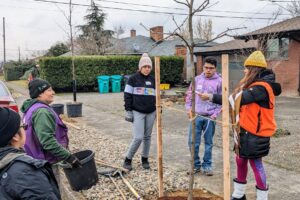
When a crew showed up to plant at a tree recipient’s home near Fernhill Park, the homeowner happily dusted off her Spanish skills to talk with the crew.
The event was smaller and more intimate than most of our neighborhood plantings, but it still made for a lively and productive morning. Four crews planted 32 trees, and celebrated over a pozole lunch.
“We wanted to keep it small to make sure it went smoothly,” Andrew said. “It went great, and hopefully this is the first of many Spanish events.”
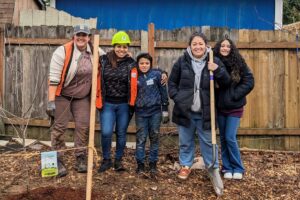
This planting is part of the Clean Air Canopy project. When a NE Portland glass plant reached a settlement with Oregon DEQ related to compliance with their air quality permit, a portion of the penalty contributed funds to approved local environmental projects, including planting trees. Friends of Trees, with partners Verde, Cully Association of Neighbors, and Cully Air Action Team, have focused on making sure these plantings are beneficial and inclusive to the communities they serve.
